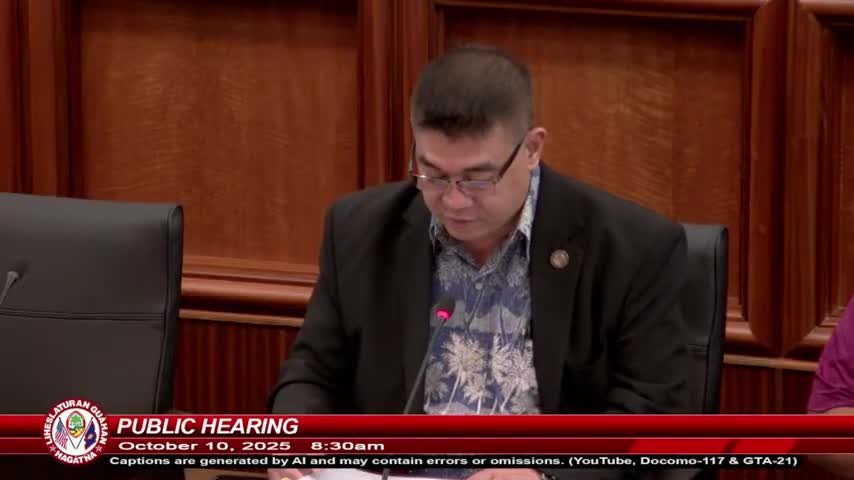Guam committee hears bill to allow third‑party permit reviews, 90‑day 'shot clock' for conditional approvals
Get AI-powered insights, summaries, and transcripts
Subscribe
Summary
A bill introduced by Speaker Frank F. Blas would allow qualified third‑party reviewers to assist agency permit reviews and create a 90‑day review clock that could trigger conditional approvals; contractors supported the idea but urged clearer rules, funding for agencies and limits on blanket approvals.
The Committee on Land, Environment, Housing, Agriculture, Parks, and Infrastructure on Friday publicly heard Bill 133‑38, the "Permanent Applications Review and Conditional Approval Act of 2025," a proposal from Speaker Frank F. Blas to authorize third‑party assistance in permanent application reviews and to establish a 90‑day review clock that could produce conditional or provisional permit approvals if an agency does not complete its review within that period.
The measure is aimed at shortening what developers and contractors described as persistent delays at agencies such as the Guam Environmental Protection Agency and the Department of Public Works. "The permit will then be conditionally or provisionally approved," Speaker Frank F. Blas said, explaining the bill's shot‑clock mechanism and the authority for third‑party assistance.
Why it matters: Testimony from the Guam Contractors Association and individual contractors described delays that they said range from weeks to 12–18 months, imposing carrying costs that can stall projects and increase prices for housing and commercial developments. "The current permit review backlog is not merely an administrative inconvenience," Desiree Lazama, president of the Guam Contractors Association, told the committee. She said the association supports the bill with revisions, including a funding mechanism for agencies that accept third‑party help and clearer definitions for who qualifies as a certifier.
Contractors asked the committee to tighten the bill's language on timelines and eligibility. Mark Mamsar, vice president of Black Construction Corporation, said staffing shortages and pay scales make it hard for agencies to hire experienced reviewers and that well‑documented examples show projects delayed for months at the permitting stage. Matthew Hunter, chairman of the Guam Contractors Association, repeated those concerns and said the association will submit suggested language to the committee.
Several senators pressed for sharper limits on conditional approvals. Senator Therese Terlahi described scenarios—such as endangered‑species reviews or structural deficiencies—where she said conditional, default approval could be inappropriate. "It sounds like conditional approval for the whole permit process," she said, urging language that confines conditional approvals to limited activities, for example grading or discrete minor items that can be corrected later. Contractors and committee members gave the example of allowing grading to begin while outstanding minor drawing corrections are resolved; in contrast, panelists and senators warned against blanket approvals when agencies have substantive compliance concerns.
Committee Chair and the bill sponsor said the measure was intentionally broad to prompt public input and that further specificity would be developed during markups. Witnesses recommended: a clear fee or funding mechanism if applicants elect third‑party review, precise certification criteria for third‑party reviewers, digital tracking and dashboards for application status, and defined timelines for mayoral and agency responses.
Agencies such as DPW and Guam EPA were invited but largely absent from the public hearing; senators and witnesses said that lack of agency testimony made it harder to precisely identify internal causes of delay. Committee Vice Chair Christopher Duenas and other senators said the legislation should not be a way to bypass public‑safety or environmental reviews but a tool to speed routine and well‑documented administrative steps.
Next steps: The committee opened a public record for written comments and requested suggested amendments. Several witnesses said they would submit proposed language by the following week. The committee indicated it will schedule a markup to refine timelines, certification standards and safeguards before moving the bill to the floor.
